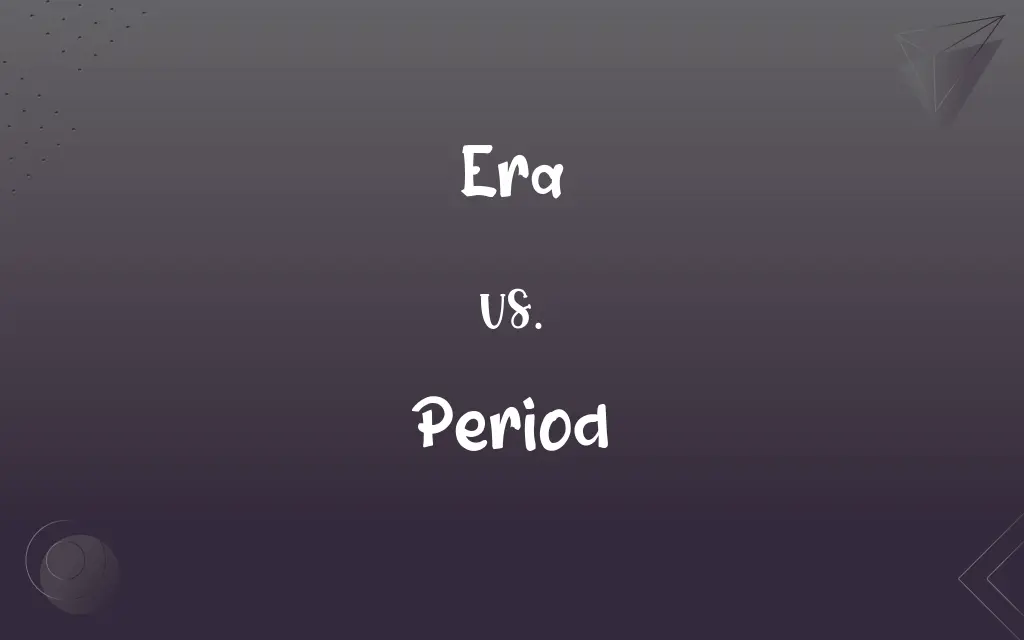Era vs. Period: What's the Difference?
Edited by Harlon Moss || By Janet White || Published on December 29, 2023
An "era" refers to a significant and distinct time period in history or a person's life, often marked by notable events or characteristics, whereas a "period" is a general term for any length of time, often without the same connotation of significance.

Key Differences
An "era" is often used to describe a notable or historic time span, marked by distinctive features, events, or personalities. For example, the Victorian era is defined by Queen Victoria's reign and its cultural norms. In contrast, "period" is a more general term, used to describe any length of time, whether it's a few minutes, days, or years, without necessarily implying historical significance.
"Era" typically carries a sense of grandeur or historical importance. For instance, the Renaissance era marks a significant cultural rebirth in Europe. On the other hand, "period" can refer to any segment of time, such as a class period in school, and is often used in more everyday contexts.
The term "era" is frequently used in a historical or grand context, like the Jurassic era in geology, signifying a distinct time with specific characteristics. Conversely, "period" is versatile, used in various contexts from scientific (like a time period) to grammatical (like a period at the end of a sentence).
"Era" often suggests a transformative or defining phase in history or life, such as the digital era. In contrast, "period" is a more neutral term, used for denoting lengths of time in various contexts, such as the gestation period of an animal.
In literature and art, an "era" might be used to describe a creative or stylistic phase, like the Baroque era. However, "period" can be used to describe the duration of an event or phenomenon, like the rainy period in a region's climate.
ADVERTISEMENT
Comparison Chart
Definition
A significant time marked by distinctive events
A length of time, not necessarily significant
Usage Context
Historical, cultural significance
General, various contexts
Implication
Grandeur, transformative change
Neutral, any duration
Examples
Renaissance era, digital era
Class period, gestation period
Connotation
Often implies historical or cultural importance
More generic, lacking specific connotations
ADVERTISEMENT
Era and Period Definitions
Era
A significant period in history.
The Medieval era was marked by feudalism and the rise of monarchies.
Period
A time interval in a particular stage.
The gestation period for elephants is about 22 months.
Era
A period with distinct characteristics.
The jazz era was known for its unique musical style.
Period
A division of time in history or a person's life.
The Romantic period was a time of great artistic expression.
Era
A phase in geology or natural history.
The Mesozoic era is known for the dominance of dinosaurs.
Period
A recurring cycle or interval.
His mood swings occur in a regular period.
Era
A time frame marked by a particular person or event.
The Elizabethan era is named after Queen Elizabeth I of England.
Period
A punctuation mark.
She ended her sentence with a period.
Era
A significant stage in the development of something.
The internet era changed communication dramatically.
Period
A length of time.
He lived in Paris for a brief period.
Era
A period of time as reckoned from a specific date serving as the basis of its chronological system.
Period
An interval of time characterized by the occurrence of a certain condition, event, or phenomenon
A period of economic prosperity.
Era
A period of time characterized by particular circumstances, events, or personages
The Colonial era of US history.
The Reagan era.
Era
The longest division of geologic time, made up of one or more periods.
Era
A time period of indeterminate length, generally more than one year.
Era
(geology) A geochronologic unit of tens to hundreds of millions of years; a subdivision of an eon, and subdivided into periods.
Era
A fixed point of time, usually an epoch, from which a series of years is reckoned.
The foundation of Solomon's temple is conjectured by Ideler to have been an era.
Era
A period of time reckoned from some particular date or epoch; a succession of years dating from some important event; as, the era of Alexander; the era of Christ, or the Christian era (see under Christian).
The first century of our era.
Era
A period of time in which a new order of things prevails; a signal stage of history; an epoch.
Painting may truly be said to have opened the new era of culture.
Era
A period marked by distinctive character or reckoned from a fixed point or event
Era
A major division of geological time; an era is usually divided into two or more periods
FAQs
Is "era" used in geology?
Yes, to denote significant geological time spans.
Does "period" have a literary use?
Yes, to describe different literary and artistic time frames.
Can "period" mean punctuation?
Yes, it refers to the dot at the end of a sentence.
Can "period" refer to short spans?
Yes, it can refer to any length of time, short or long.
Does "era" imply transformation?
Often, it suggests significant changes or developments.
Is "era" always historic?
Often, but it can also refer to significant contemporary times.
Can "era" signify a personal phase?
Yes, like referring to someone's childhood as an era.
Is "period" used in sports?
Yes, to denote segments of time in a game.
Do historians use "era" frequently?
Yes, to denote historically significant periods.
Is "period" neutral in tone?
Generally, it's a neutral term for time duration.
Can "era" be subjective?
Yes, its significance can vary based on perspective.
Does "period" refer to regular cycles?
Yes, like menstrual or economic cycles.
Are all eras named after people?
Not necessarily, some are named after events or characteristics.
Does "period" denote finality?
In punctuation, yes; in time, it's more neutral.
Is "era" a formal term?
It can be, especially in historical or academic contexts.
Does "period" have multiple meanings?
Yes, from time spans to punctuation marks.
Is "period" scientific?
Yes, used in science to denote time intervals.
Can "era" be used in fashion?
Yes, to denote significant fashion trends in history.
Are "eras" always long?
Not always, some modern eras may be relatively short.
Can "period" be used casually?
Yes, it's common in everyday speech.
About Author
Written by
Janet WhiteJanet White has been an esteemed writer and blogger for Difference Wiki. Holding a Master's degree in Science and Medical Journalism from the prestigious Boston University, she has consistently demonstrated her expertise and passion for her field. When she's not immersed in her work, Janet relishes her time exercising, delving into a good book, and cherishing moments with friends and family.
Edited by
Harlon MossHarlon is a seasoned quality moderator and accomplished content writer for Difference Wiki. An alumnus of the prestigious University of California, he earned his degree in Computer Science. Leveraging his academic background, Harlon brings a meticulous and informed perspective to his work, ensuring content accuracy and excellence.






































































